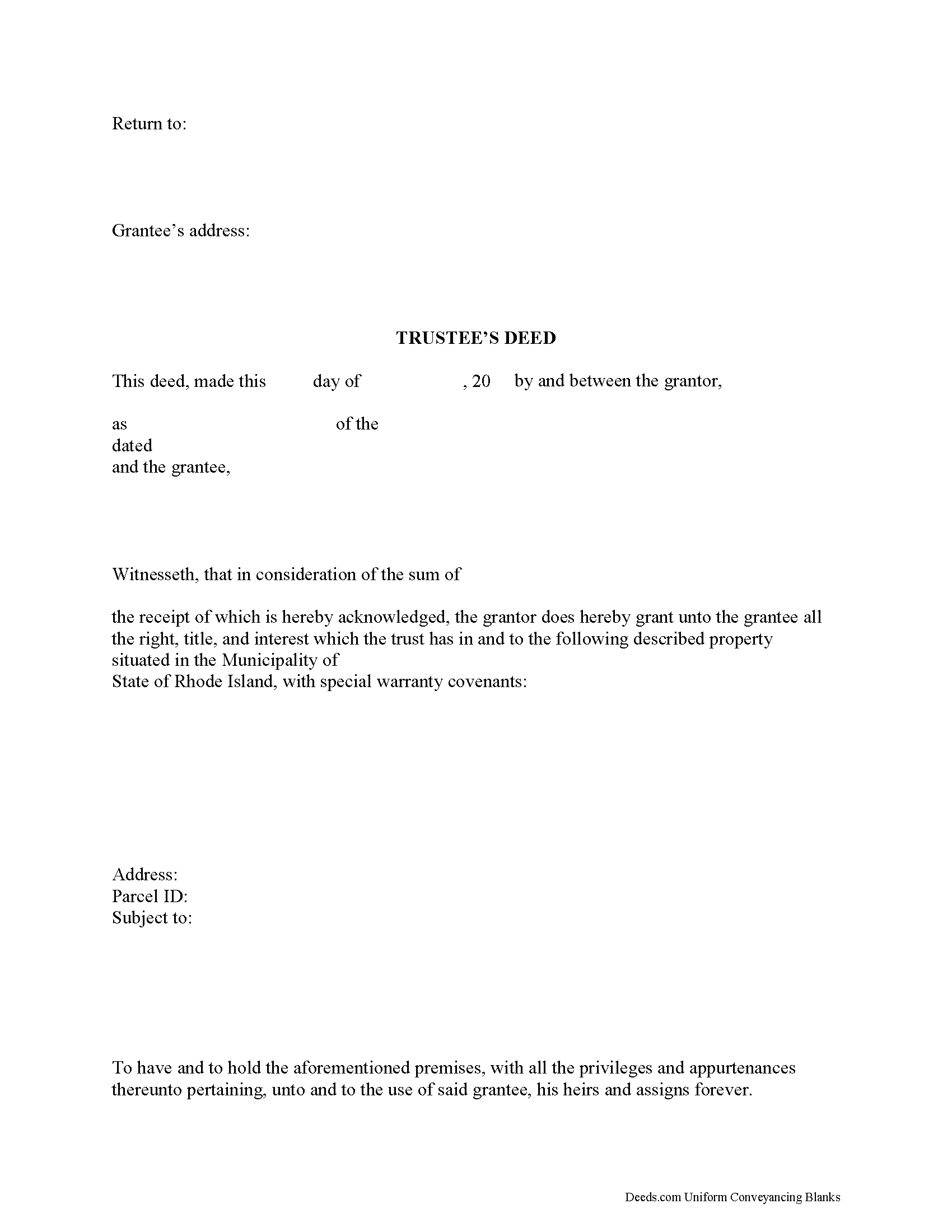Rhode Island Trustee Deed
County Specific Legal Forms Validated as Recently as September 2, 2025
About the Rhode Island Trustee Deed

How to Use This Form
- Select your county from the list on the left
- Download the county-specific form
- Fill in the required information
- Have the document notarized if required
- Record with your county recorder's office
What Others Like You Are Saying
“Love your site. I found just what I needed and it was so easy. Saved me countless time and effort. W…”
— Larry P.“Brilliant idea. Beats working with an attorney who charges $250+ per hour. Thanks.”
— Dakota H.“Well done. A little pricy.”
— Daniel D.“The deed is presently at the auditors office and will be recorded after approval from zoning board. …”
— Sara R.“I appreciated the fact that the forms were by Texas County and I knew I had the right form. The form…”
— Marlene B.
Transferring real property from a living trust requires a trustee's deed. Executed by a trustee, the deed is named for the granting party rather than for the type of warranty the deed offers (as with a warranty deed). It is codified at R.I.G.L. 34-11-12(3).
In a living trust, a settlor transfers assets to a trustee, who holds and manages the property for the benefit of a third party (the trust beneficiary). Transfer of real property into the trust is generally completed by a deed executed by the settlor and naming the trustee as grantee.
In order to convey real property from the trust, the trustee acts on powers granted to him by the settlor in the trust instrument. Most trust instruments include a general power of sale, and trustees in Rhode Island may act on their power to sell pursuant to the terms of the trust instrument and R.I.G.L. 18-4-4. Transfers of real property out of trust require an accompanying affidavit or memorandum of trust under R.I.G.L. 34-4-27 confirming the trustee's authority to convey interest in real property held in trust.
Most deeds in Rhode Island fall under one of two categories. Offering a broad level of warranty, a warranty deed contains warranty covenants that the grantor will warrant and defend title against the lawful claims of all persons. A statutory quitclaim deed contains covenants that the grantor will warrant and defend title against the lawful claims of persons claiming under, by, or through the grantor only.
Rhode Island is unique in this aspect; generally, a quitclaim deed simply transfers any interest the grantor may have in the property, offering no covenants or warranties of title. This makes the Rhode Island quitclaim deed more akin to a special warranty deed. In fact, legislation has been introduced to include a designation for special warranty deed covenants into the existing quitclaim deed statutes (see HB 7573). A special warranty deed generally conveys title with the language "with special warranty covenants" on the part of the grantor that he will warrant and defend the title against the claims of persons claiming under, by, or through him (but no one else).
The Rhode Island trustee's deed conveys title in fee simple to the grantee with special warranty/quitclaim covenants of title. (A trustee's deed generally carries a special warranty, as the trustee may have no prior knowledge of the title prior to his role as fiduciary.) The name of each acting trustee, as well as the trust's name and date, appear in the granting clause. The deed should meet all standards for form and content for conveyances of real property in Rhode Island, including a legal description of the subject property and statements of compliance with Rhode Island's residency and fire safety requirements.
The deed must be signed by each trustee in the presence of a notary public before recording in the municipality where the property is located.
Consult a lawyer with questions about living trusts and preparing trustee's deeds in Rhode Island.
(Rhode Island TD Package includes form, guidelines, and completed example)
Important: County-Specific Forms
Our trustee deed forms are specifically formatted for each county in Rhode Island.
After selecting your county, you'll receive forms that meet all local recording requirements, ensuring your documents will be accepted without delays or rejection fees.
How to Use This Form
- Select your county from the list above
- Download the county-specific form
- Fill in the required information
- Have the document notarized if required
- Record with your county recorder's office
What Others Like You Are Saying
“Love your site. I found just what I needed and it was so easy. Saved me countless time and effort. W…”
— Larry P.“Brilliant idea. Beats working with an attorney who charges $250+ per hour. Thanks.”
— Dakota H.“Well done. A little pricy.”
— Daniel D.“The deed is presently at the auditors office and will be recorded after approval from zoning board. …”
— Sara R.“I appreciated the fact that the forms were by Texas County and I knew I had the right form. The form…”
— Marlene B.Common Uses for Trustee Deed
- Transfer property between family members
- Add or remove names from property titles
- Transfer property into or out of trusts
- Correct errors in previously recorded deeds
- Gift property to others